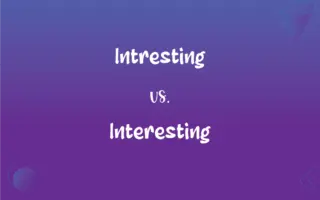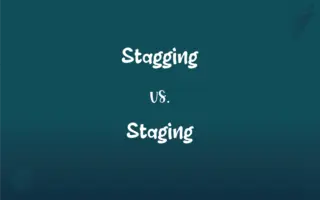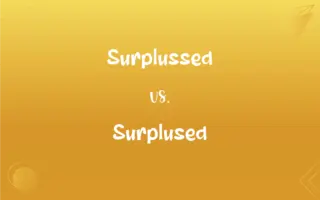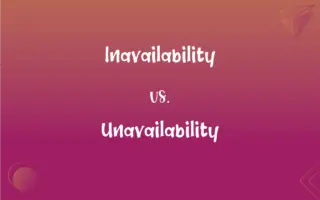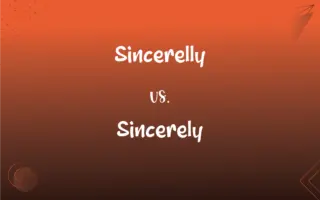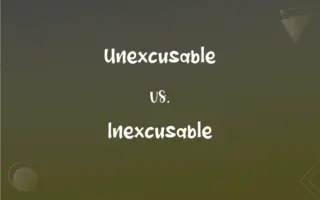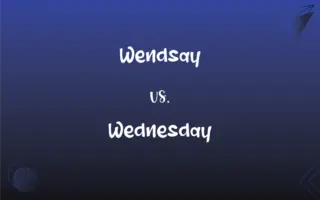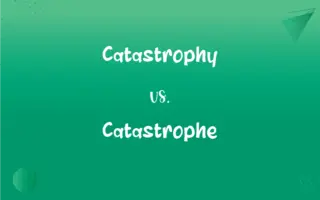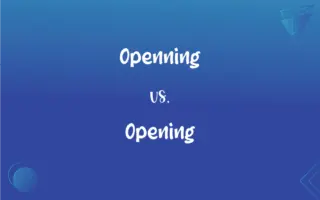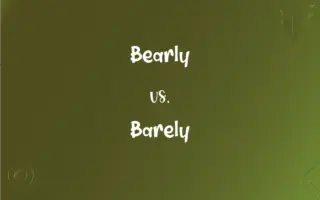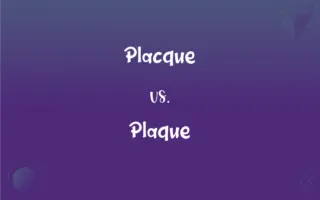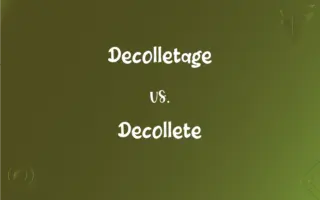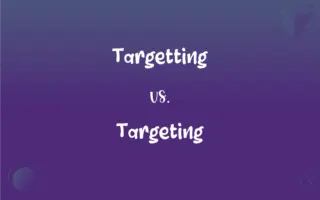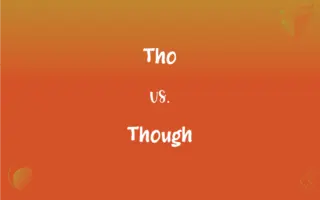Unfortunatly vs. Unfortunately: Mastering the Correct Spelling
Edited by Aimie Carlson || By Janet White || Updated on March 13, 2024
The incorrect spelling is "Unfortunatly," while the correct spelling is "Unfortunately." Unfortunately is an adverb used to express regret or bad luck.
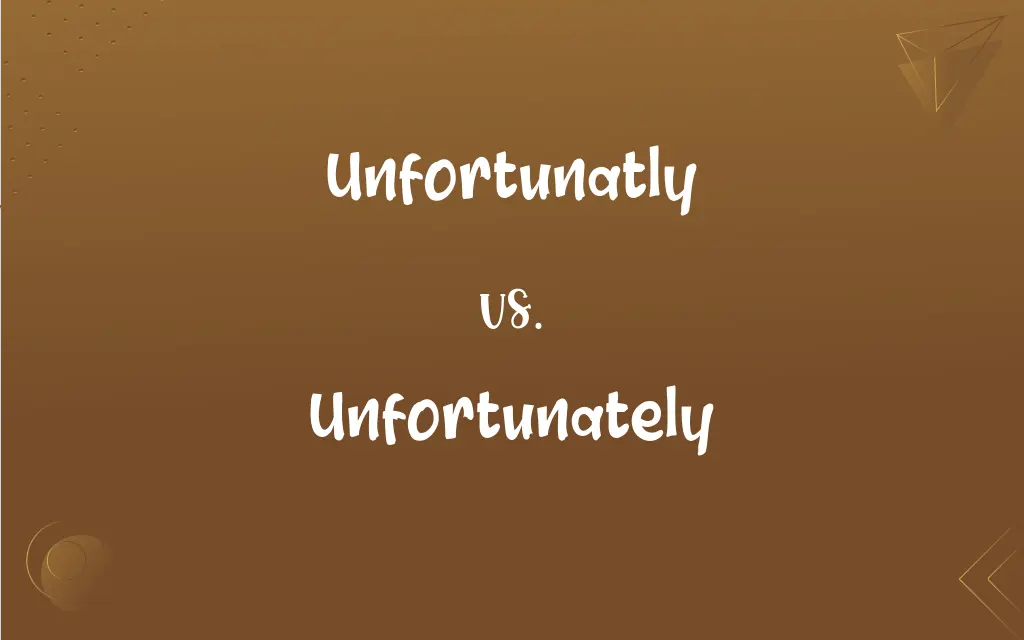
Which is correct: Unfortunatly or Unfortunately
How to spell Unfortunately?

Unfortunatly is Incorrect

Unfortunately is Correct
ADVERTISEMENT
Key Differences
Think of it as "unfortunate" with 'ly' at the end.
Consider the word "fortunately" and simply add 'un-' at the beginning.
Remember that words ending in "-ately" generally include the entire base adjective, like "deliberate" to "deliberately."
Memorize the word as un-for-tun-ate-ly, making sure to include the 'e' before 'ly.'
Break the word down to its root "fortune," then add 'un-' and '-ately' to make it "unfortunately."
ADVERTISEMENT
Correct usage of Unfortunately
She unfortunatly lost her keys at the park.
She unfortunately lost her keys at the park.
He unfortunatly missed the last train home.
He unfortunately missed the last train home.
Unfortunately, the store was closed by the time we arrived.
The weather turned unfortunatly just as the picnic started.
The weather turned unfortunately just as the picnic started.
I unfortunatly have to cancel our meeting for tomorrow.
I unfortunately have to cancel our meeting for tomorrow.
Unfortunately Definitions
Unfortunately is often used to introduce bad news.
Unfortunately, the concert was canceled.
Unfortunately can express a lack of luck.
Unfortunately, I didn't win the lottery.
Unfortunately is used to express regret about an event.
Unfortunately, the train was delayed.
Unfortunately is used to acknowledge an unfavorable situation.
Unfortunately, the test was harder than I thought.
Having bad luck; unlucky.
Characterized by, bringing, or causing misfortune
An unfortunate turn of events.
Regrettable; deplorable
An unfortunate lack of good manners.
A victim of bad luck.
Happening through bad luck, or because of some unfortunate event.
The houses which burned down could have been saved. Unfortunately, the fire truck had broken down on the way.
By bad luck;
Unfortunately it rained all day
Alas, I cannot stay
Unfortunately can be used to signify missed opportunities.
Unfortunately, she couldn't make it to the event.
Unfortunately Sentences
He was unfortunately caught in the rain without an umbrella.
Unfortunately, the concert has been postponed to next month.
Unfortunately, I forgot to bring the documents to the meeting.
The event was unfortunately canceled at the last minute.
Unfortunately, we won't be able to attend your birthday party.
Unfortunately, the cake didn't turn out as expected.
The team played well but unfortunately lost the game.
He was looking forward to the trip, but unfortunately, he got sick.
They were unfortunately out of my favorite ice cream flavor.
Unfortunately, we're facing some unexpected challenges with the project.
I was excited about the sale, but unfortunately, I arrived too late.
Our flight was unfortunately delayed due to bad weather.
She tried her best but unfortunately didn't pass the exam.
I wanted to buy that book, but unfortunately, it's sold out.
The picnic was fun, but unfortunately, it started to rain.
She wanted to apologize, but unfortunately, she couldn't find the right words.
We were hoping to go hiking, but unfortunately, the trails are closed.
Unfortunately, we have to increase our prices due to rising costs.
The lecture was interesting, but unfortunately, it was hard to hear at the back.
She hoped to see the stars, but unfortunately, it was too cloudy.
They made a valiant effort but were unfortunately defeated.
Unfortunately, I'll need to work late tonight and can't join you.
Unfortunately, the restaurant is fully booked for tonight.
Unfortunately, we'll have to rethink our strategy moving forward.
Unfortunately, the package arrived damaged.
Unfortunately Idioms & Phrases
Unfortunately, as it turns out
Regrettably, based on the outcome.
Unfortunately, as it turns out, the investment wasn't as profitable as expected.
Unfortunately for someone
Sadly for a particular person.
Unfortunately for him, he was the last to know about the surprise party.
Unfortunately for us all
Sadly for everyone involved.
Unfortunately for us all, the community center will be closing.
FAQs
What is the root word of Unfortunately?
The root word is "fortunate."
Which conjunction is used with Unfortunately?
"But" is often used, as in "I wanted to go, but unfortunately, I couldn't."
What is the pronunciation of Unfortunately?
Pronounced as /ʌnˈfɔːr.tʃən.ɪt.li/.
Why is it called Unfortunately?
It is derived from the word "unfortunate," used to signify bad luck or regret, with the adverbial suffix '-ly.'
Is Unfortunately an abstract noun?
No, it's an adverb.
What is the verb form of Unfortunately?
The related verb form would be "unfortunate."
Which vowel is used before Unfortunately?
No vowel is typically used before "unfortunately."
What is the singular form of Unfortunately?
Unfortunately is an adverb, so it doesn't have a singular or plural form.
Is Unfortunately a negative or positive word?
It is generally considered a negative word as it often introduces bad news or regret.
Which preposition is used with Unfortunately?
None is commonly used specifically with "unfortunately."
Is Unfortunately a vowel or consonant?
It's a word, not a vowel or consonant.
Is Unfortunately a collective noun?
No, it's an adverb.
Is the Unfortunately term a metaphor?
No, it's not a metaphor.
How many syllables are in Unfortunately?
Five syllables.
What is the opposite of Unfortunately?
The opposite could be "fortunately."
What is the plural form of Unfortunately?
Again, as an adverb, it doesn't have a plural form.
What is a stressed syllable in Unfortunately?
The third syllable, "tu," is stressed.
What is another term for Unfortunately?
Another term could be "regrettably."
Is Unfortunately a countable noun?
It's not a noun, so it's not countable.
What part of speech is Unfortunately?
It is an adverb.
Which determiner is used with Unfortunately?
None, as it's an adverb.
What is the first form of Unfortunately?
N/A, as it is an adverb.
How is Unfortunately used in a sentence?
Example: Unfortunately, we will have to cancel the event due to bad weather.
Which article is used with Unfortunately?
No article is typically used with "unfortunately."
Is the word Unfortunately imperative?
No, it's not imperative.
How do we divide Unfortunately into syllables?
Un-for-tu-nate-ly.
What is the third form of Unfortunately?
N/A, as it is an adverb.
Is Unfortunately a noun or adjective?
It's an adverb.
Is Unfortunately an adverb?
Yes, it is an adverb.
What is the second form of Unfortunately?
N/A, as it is an adverb.
About Author
Written by
Janet WhiteJanet White has been an esteemed writer and blogger for Difference Wiki. Holding a Master's degree in Science and Medical Journalism from the prestigious Boston University, she has consistently demonstrated her expertise and passion for her field. When she's not immersed in her work, Janet relishes her time exercising, delving into a good book, and cherishing moments with friends and family.
Edited by
Aimie CarlsonAimie Carlson, holding a master's degree in English literature, is a fervent English language enthusiast. She lends her writing talents to Difference Wiki, a prominent website that specializes in comparisons, offering readers insightful analyses that both captivate and inform.
